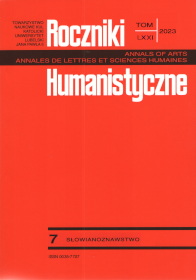Tрансформация восприятия ключевых имен и произведений русской классической литературы в образовательном дискурсе Словакии (до и после 1989 года)
Transformation of Perception of Key Names and Works of Russian Classic Literature in Slovak Educational Discourse (Before and After 1989)
Author(s): Nina Cingerová, Irina DulebováSubject(s): Politics / Political Sciences, Politics, Language and Literature Studies, Studies of Literature, Russian Literature, Government/Political systems
Published by: Towarzystwo Naukowe KUL & Katolicki Uniwersytet Lubelski Jana Pawła II
Keywords: educational discourse; transformation; literature; communist ideologems; democratic transformation
Summary/Abstract: Large-scale events entailing changes in political, economic and social conditions, as a rule, also dynamize temporarily fixed identities of cultural signs. In the history of Slovakia, some of the biggest «explosions» of this quality were the February 1948 coup d’état, which ended with the establishment of the communist regime in the former Czechoslovakia, and the so-called Velvet Revolution of 1989, which marked its end. We have analysed the essence of these transformations on the basis of secondary school textbooks published before and after 1989. In our research we rely on the discourse theory presented in the works from Ernesto Laclau and Chantal Mouffe (Essex School of discourse analysis. The objectives were to: a) capture the attachment of a particular signifier, in our case the writer, to a particular nodal point; b) identify speech, or broader – discourse strategies; c) capture the transformation of interpretations. From the analysis of these fragments of discourse, we have documented in relation to pre-1989 discourse the rules of discursive modelling, such as the principle of socio-economic formations, the «enchoring» of writers and their works to the «class struggle» focal point, the teleological character of the writers' creative path, correlated to the principles of solemn monumental style, and the actualisation of communist ideologems. The most notable transformation in discourse since 1989 has been the de-ideologisation of the established narratives circulating in educational discourse, and a kind of tabloidization of literary discourse. The main goal is thus to attract the attention of the recipient.
Journal: Roczniki Humanistyczne
- Issue Year: 71/2023
- Issue No: 7
- Page Range: 135-154
- Page Count: 20
- Language: Russian

